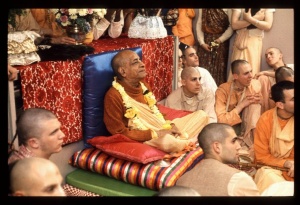SB 10.85.39: Difference between revisions
m (1 revision(s)) |
(Vanibot #0054 edit - transform synonyms into clickable links, which search similar occurrences) |
||
| (One intermediate revision by one other user not shown) | |||
| Line 1: | Line 1: | ||
{{info | {{info | ||
|speaker=King Bali | |speaker=King Bali | ||
|listener=Lord | |listener=Lord Kṛṣṇa and Balarāma the Supreme Personalities of Godhead | ||
}} | }} | ||
[[Category:Srimad-Bhagavatam - Canto 10 Chapter 85]] | |||
[[Category:Bhagavatam Verses Spoken by Bali Maharaja - Vanisource|108539]] | |||
<div style="float:left">'''[[Srimad-Bhagavatam]] - [[SB 10|Tenth Canto]] - [[SB 10.85: Lord Krsna Instructs Vasudeva and Retrieves Devaki's Sons|Chapter 85: Lord Kṛṣṇa Instructs Vasudeva and Retrieves Devakī's Sons]]'''</div> | |||
<div style="float:right">[[File:Go-previous.png|link=SB 10.85.38]] '''[[SB 10.85.38]] - [[SB 10.85.40]]''' [[File:Go-next.png|link=SB 10.85.40]]</div> | |||
{{RandomImage}} | |||
{{SBnotice}} | |||
==== TEXT 39 ==== | ==== TEXT 39 ==== | ||
<div | <div class="verse"> | ||
balir uvāca | :balir uvāca | ||
namo 'nantāya bṛhate | :namo 'nantāya bṛhate | ||
namaḥ kṛṣṇāya vedhase | :namaḥ kṛṣṇāya vedhase | ||
sāṅkhya-yoga-vitānāya | :sāṅkhya-yoga-vitānāya | ||
brahmaṇe paramātmane | :brahmaṇe paramātmane | ||
</div> | </div> | ||
| Line 18: | Line 23: | ||
==== SYNONYMS ==== | ==== SYNONYMS ==== | ||
<div | <div class="synonyms"> | ||
baliḥ | ''[//vanipedia.org/wiki/Special:VaniSearch?s=baliḥ&tab=syno_o&ds=1 baliḥ] [//vanipedia.org/wiki/Special:VaniSearch?s=uvāca&tab=syno_o&ds=1 uvāca]'' — Bali said; ''[//vanipedia.org/wiki/Special:VaniSearch?s=namaḥ&tab=syno_o&ds=1 namaḥ]'' — obeisances; ''[//vanipedia.org/wiki/Special:VaniSearch?s=anantāya&tab=syno_o&ds=1 anantāya]'' — to Ananta, the unlimited Lord; ''[//vanipedia.org/wiki/Special:VaniSearch?s=bṛhate&tab=syno_o&ds=1 bṛhate]'' — the greatest being; ''[//vanipedia.org/wiki/Special:VaniSearch?s=namaḥ&tab=syno_o&ds=1 namaḥ]'' — obeisances; ''[//vanipedia.org/wiki/Special:VaniSearch?s=kṛṣṇāya&tab=syno_o&ds=1 kṛṣṇāya]'' — to Kṛṣṇa; ''[//vanipedia.org/wiki/Special:VaniSearch?s=vedhase&tab=syno_o&ds=1 vedhase]'' — the creator; ''[//vanipedia.org/wiki/Special:VaniSearch?s=sāṅkhya&tab=syno_o&ds=1 sāṅkhya]'' — of sāṅkhya analysis; ''[//vanipedia.org/wiki/Special:VaniSearch?s=yoga&tab=syno_o&ds=1 yoga]'' — and of mystic yoga; ''[//vanipedia.org/wiki/Special:VaniSearch?s=vitānāya&tab=syno_o&ds=1 vitānāya]'' — the disseminator; ''[//vanipedia.org/wiki/Special:VaniSearch?s=brahmaṇe&tab=syno_o&ds=1 brahmaṇe]'' — the Absolute Truth; ''[//vanipedia.org/wiki/Special:VaniSearch?s=parama&tab=syno_o&ds=1 parama]-[//vanipedia.org/wiki/Special:VaniSearch?s=ātmane&tab=syno_o&ds=1 ātmane]'' — the Supersoul. | ||
</div> | </div> | ||
{{SBcollapse}} | |||
==== TRANSLATION ==== | ==== TRANSLATION ==== | ||
<div | <div class="translation"> | ||
King Bali said: Obeisances to the unlimited Lord, Ananta, the greatest of all beings. And obeisances to Lord Kṛṣṇa, the creator of the universe, who appears as the impersonal Absolute and the Supersoul in order to disseminate the principles of sāṅkhya and yoga. | King Bali said: Obeisances to the unlimited Lord, Ananta, the greatest of all beings. And obeisances to Lord Kṛṣṇa, the creator of the universe, who appears as the impersonal Absolute and the Supersoul in order to disseminate the principles of sāṅkhya and yoga. | ||
</div> | </div> | ||
| Line 32: | Line 37: | ||
==== PURPORT ==== | ==== PURPORT ==== | ||
<div | <div class="purport"> | ||
Śrīla Viśvanātha Cakravartī identifies the supreme Ananta named here as Lord Balarāma, from whom expands the divine serpent Ananta Śeṣa. Impersonal Brahman is the source of the texts belonging to the sāṅkhya philosophers, while the personal representation of the Lord known as Paramātmā disseminates the textbooks of yoga. | Śrīla Viśvanātha Cakravartī identifies the supreme Ananta named here as Lord Balarāma, from whom expands the divine serpent Ananta Śeṣa. Impersonal Brahman is the source of the texts belonging to the ''sāṅkhya'' philosophers, while the personal representation of the Lord known as Paramātmā disseminates the textbooks of ''yoga''. | ||
</div> | </div> | ||
__NOTOC__ | </div> | ||
</div> | |||
<div style="float:right">[[File:Go-previous.png|link=SB 10.85.38]] '''[[SB 10.85.38]] - [[SB 10.85.40]]''' [[File:Go-next.png|link=SB 10.85.40]]</div> | |||
__NOTOC__ | |||
__NOEDITSECTION__ | |||
Latest revision as of 20:08, 17 February 2024

A.C. Bhaktivedanta Swami Prabhupada
Please note: The synonyms, translation and purport of this verse were composed by disciples of Śrīla Prabhupāda
TEXT 39
- balir uvāca
- namo 'nantāya bṛhate
- namaḥ kṛṣṇāya vedhase
- sāṅkhya-yoga-vitānāya
- brahmaṇe paramātmane
SYNONYMS
baliḥ uvāca — Bali said; namaḥ — obeisances; anantāya — to Ananta, the unlimited Lord; bṛhate — the greatest being; namaḥ — obeisances; kṛṣṇāya — to Kṛṣṇa; vedhase — the creator; sāṅkhya — of sāṅkhya analysis; yoga — and of mystic yoga; vitānāya — the disseminator; brahmaṇe — the Absolute Truth; parama-ātmane — the Supersoul.
Translation and purport composed by disciples of Śrīla Prabhupāda
TRANSLATION
King Bali said: Obeisances to the unlimited Lord, Ananta, the greatest of all beings. And obeisances to Lord Kṛṣṇa, the creator of the universe, who appears as the impersonal Absolute and the Supersoul in order to disseminate the principles of sāṅkhya and yoga.
PURPORT
Śrīla Viśvanātha Cakravartī identifies the supreme Ananta named here as Lord Balarāma, from whom expands the divine serpent Ananta Śeṣa. Impersonal Brahman is the source of the texts belonging to the sāṅkhya philosophers, while the personal representation of the Lord known as Paramātmā disseminates the textbooks of yoga.